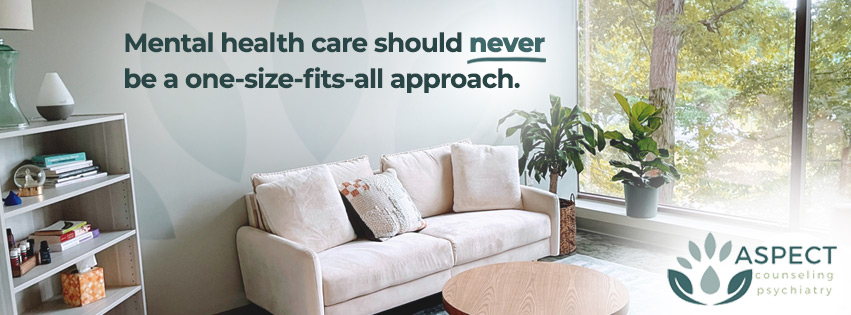If you’re looking for gender dysphoria therapists in Richmond, VA, you’ve already taken an important step toward understanding and supporting yourself, or your child, on their journey.
Whether you’re an adult exploring your gender identity or a parent seeking compassionate counseling for your teen, specialized therapy can provide clarity, coping strategies, and a safe, affirming environment.
Not only do we provide counseling, but our therapists work closely with our board-certified nurse practitioners to provide even more comprehensive care. Our PMHNPs can diagnose certain conditions and prescribe medication, if needed.

- Our gender dysphoria therapists are available for in-person sessions in Richmond, VA, as well as telehealth throughout Virginia
- We never take a one-size-fits-all approach; every client is unique
- Our PMHNPs work alongside our therapists to help with prescribing medication, if needed, and even more advanced care
If you’re curious how a gender dysphoria therapist might be able to help, read on to learn more about gender identity disorder, the therapies we use to treat it, and what your options are.
- What is Gender Dysphoria?
- Is Gender Dysphoria the Same as Gender Identity Disorder?
- Gender Dysphoria Challenges
- Common Issues Transgender People Experience
- Therapy for Transgender Youth
- Types of Therapy Used to Treat Gender Dysphoria
- How Our Gender Dysphoria Therapists Can Help
- What to Expect During Your Therapy Session
- FAQs Related to Gender Dysphoria Treatment
- Our Therapy Office
- Talk to Someone Today
What is Gender Dysphoria?
Gender dysphoria is the psychological distress that occurs when someone’s assigned sex at birth doesn’t align with their gender identity. It’s important to note that being transgender or gender-diverse is not a mental illness—the distress that can come from the mismatch is what may require treatment.
Quick facts about gender dysphoria (sources: American Psychiatric Association, Mayo Clinic):
- Gender dysphoria is recognized in the DSM-5 as a mental health condition.
- Symptoms often appear in early childhood but can also emerge during adolescence or adulthood.
- Treatment focuses on reducing distress and improving mental health, not changing someone’s identity.
Is Gender Dysphoria the Same as Gender Identity Disorder?
In past versions of the DSM (DSM-IV and earlier), the term “gender identity disorder” was used. The DSM-5 updated this terminology to gender dysphoria to remove stigma and emphasize emotional distress rather than identity.
| Gender Identity Disorder (Old Term) | Gender Dysphoria (Current Term) |
|---|---|
| Classified identity itself as a “disorder” | Focuses on the distress from the mismatch |
| Pathologizing language | Affirming, person-first language |
| Used in DSM-IV | Used in DSM-5 and onward |
| Seen as controversial and stigmatizing | More accepted by medical and mental health professionals |
The change reflects a shift toward respecting and affirming transgender and gender-diverse people. Our office fully supports the current term, gender dysphoria, and always refers to it as such.
Gender Dysphoria Challenges
People with gender dysphoria may experience a range of emotions and challenges. Common feelings include:
- Persistent desire to be treated as another gender
- Strong discomfort with primary or secondary sex characteristics
- Intense need to change appearance to match gender identity
- Avoidance of social situations due to identity distress
- Depression, anxiety, or withdrawal linked to gender identity struggles
Common Issues Transgender People Experience
Transgender and gender-diverse individuals may also face broader social and emotional challenges:
- Discrimination or bullying at school, work, or in public settings
- Family conflict or lack of acceptance
- Fear of judgment when seeking healthcare
- Increased risk of anxiety, depression, and suicidal thoughts without support
Therapy with a gender-affirming counselor can provide a safe space to navigate these experiences.
Therapy for Transgender Youth
Teens exploring their gender identity face unique challenges as well. Therapy for youth & teens can provide:
- A safe environment to talk openly about identity and feelings
- Support for parents and families to foster understanding
- Help with navigating school, peer relationships, and social challenges
- Early intervention that can reduce long-term distress and mental health risks
If you’re looking for therapy for your transgender child, our therapists are experienced working with both children and their parents on various transgender issues.
Types of Therapy Used to Treat Gender Dysphoria
Different approaches may be used depending on individual needs:
- Cognitive Behavioral Therapy (CBT) – Helps address anxiety, depression, and coping skills.
- Gender-affirming therapy – Focused on support, exploration, and identity acceptance.
- Family therapy – Encourages communication and understanding among loved ones.
- Supportive counseling – Helps with transition planning, social challenges, and resilience building.
How Our Gender Dysphoria Therapists Can Help
Our Richmond-based therapists specialize in transgender issues and provide:
- a safe, nonjudgmental environment
- individual therapy sessions tailored to your goals
- support for parents and families navigating the transition process
- guidance with school, workplace, and healthcare-related challenges
- tools to build confidence and resilience

Allison Ernest
PMHNP-BC, RN, MSN

Amber Zarger
LCSW

Carla Crews
LCSW

Carlie Powers
LMFT, CST, CAADC

Elizabeth Markey
PMHNP-BC, MSN, CNM, PMH-C

Gabby Scalzo
PhD, LCP

Jennifer Peele
PMHNP, FNP-BC, APRN

Jonathan Yoder
PMHNP-BC

Kristina Gilbert
LPC

Laurie Manns
LPC, CSAC

Leigh Carter
PMHNP-BC, RN, MSN

Mikeyda Travers
LPC

Paula Connolly
LCSW

Robyn D’Reaux-Rodgers
LCSW

Ryan Ernest
PMHNP-BC

Shenika Whitaker-Carlos
LCSW, CSOTP
What to Expect During Your Therapy Session
During your first few sessions, you can expect:
- An assessment: Understanding your history, experiences, and goals
- Discussion of concerns: Exploring feelings of identity, distress, or challenges
- Treatment planning: Developing strategies for coping and growth
- Ongoing support: Regular sessions that may include individual, family, or group therapy
Every session is tailored to your needs. We want to ensure your therapy feels affirming and supportive, whatever that might look like for you.
FAQs Related to Gender Dysphoria Treatment
It refers to the emotional distress caused when someone’s gender identity does not align with their sex assigned at birth.
Yes. Gender dysphoria is a mental health disorder, as recognized in the DSM-5. It’s important to note that simply being transgender is NOT a mental health. The distress that may come along with it is what classifies it in the DSM-5.
Gender-affirming therapy combined with supportive care. For some, medical interventions may also help, but therapy is a good place to start. Our office has both therapists & board-certified nurse practitioners who can administer medication, if needed.
Yes. Family therapy or parent support counseling helps families better understand and support their loved one. We offer this type of service for parents of children experiencing gender dysphoria.
Yes. Our practice supports both adults and teens exploring or navigating gender identity concerns.
Yes. Our office accepts many forms of insurance, including medicare. Check our insurance page for a complete list of insurance providers.
Our Therapy Office
Our therapy office is located in the heart of West End Richmond, in the Innsbrook business complex—at the crossroads of I-64, I-295, Hwy 288, and West Broad St. We share the Liberty Plaza I building with several law offices, financial services companies, and other Richmond-area businesses, at the corner of Cox Rd. & North Park Dr.
4801 Cox Road, Suite 205
Glen Allen, VA 23060
Directions →

Talk to Someone Today
If you’re looking for gender dysphoria therapists in Richmond, VA, our licensed professionals are here for you.
Contact us today to schedule your first session.
